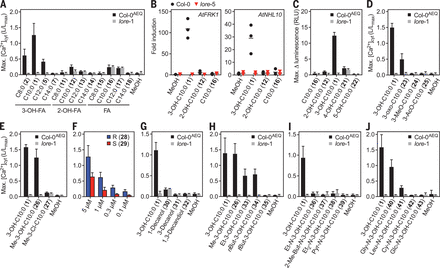Revealing Short-Chain Fatty Acids Triggering Plant Immune Responses to Bacteria
Like humans and animals, plants can fight against pathogens with the help of the immune system. But how does the pathogen activate the plant's cellular defense? In a new study, researchers from the Technical University of Munich (TUM) in Germany found that receptors in plant cells recognize bacteria through simple molecular building blocks.
Dr. Stefanie Ranf, the author of the paper and chairman of the Plant Pathology at the Technical University of Munich, said, “The immune system of plants is much more complicated than we think.” Ranf and an international research team have discovered substances that activate plant immune defenses.
Until then, scientists have long believed that plant cells -- similar to human and animal cells -- recognize bacteria through complex molecular compounds such as those from bacterial cell walls. In particular, as a molecule composed of a fat-like portion and a sugar molecule, lipopolysaccharide (LPS) is suspected of eliciting an immune response.
In 2015, Ranf and his team have successfully identified its receptor protein LORE (lipo-oligosaccharide-specific reduced elicitation). All experiments have shown that when the LORE protein detects LPS molecules from certain bacterial cell walls, it activates the immune system of plant cells.
 Return to the correct track
Return to the correct track
Ranf said, "When we want to study this receptor protein further, the surprise comes. Our goal is to find out how LORE distinguishes between different LPS molecules. To do this, we need high purity LPS."
The researchers found that LPS samples containing only certain short-chain fatty acid components can trigger plant immune defenses. Surprisingly, they found very strong free fatty acid molecules in all of these active LPS samples. After several months of experimentation, they were able to separate these free fatty acids from LPS.
Ranf said, “When we finally succeeded in producing highly purified LPS, it became clear that plant cells did not respond to them at all! Therefore, it is clear that this immune response is not triggered by LPS, but by these short-chain fatty acids."
Targeted bacterial building block
3-hydroxy fatty acids are very simple chemical building blocks compared to larger LPS. They are essential for bacteria and are integrated into various cellular components upon large production.
Ranf concludes, “The strategy for plant cells to recognize bacteria through these basic building blocks is very complex; bacteria need these 3-hydroxy fatty acids, so they cannot escape the plant's immune response.”
Plant improvement plan
In the future, these results may help to breed or genetically modify plants to increase their immune response. It is also conceivable that plants treated with 3-hydroxy fatty acids have increased resistance to pathogenic bacteria.
Reference
Alexander Kutschera et al. Bacterial medium-chain 3-hydroxy fatty acid metabolites trigger immunity in Arabidopsis plants. Science, 2019, doi:10.1126/science.aau1279. For research or industrial raw materials, not for personal medical use!
 Return to the correct track
Ranf said, "When we want to study this receptor protein further, the surprise comes. Our goal is to find out how LORE distinguishes between different LPS molecules. To do this, we need high purity LPS."
The researchers found that LPS samples containing only certain short-chain fatty acid components can trigger plant immune defenses. Surprisingly, they found very strong free fatty acid molecules in all of these active LPS samples. After several months of experimentation, they were able to separate these free fatty acids from LPS.
Ranf said, “When we finally succeeded in producing highly purified LPS, it became clear that plant cells did not respond to them at all! Therefore, it is clear that this immune response is not triggered by LPS, but by these short-chain fatty acids."
Targeted bacterial building block
3-hydroxy fatty acids are very simple chemical building blocks compared to larger LPS. They are essential for bacteria and are integrated into various cellular components upon large production.
Ranf concludes, “The strategy for plant cells to recognize bacteria through these basic building blocks is very complex; bacteria need these 3-hydroxy fatty acids, so they cannot escape the plant's immune response.”
Plant improvement plan
In the future, these results may help to breed or genetically modify plants to increase their immune response. It is also conceivable that plants treated with 3-hydroxy fatty acids have increased resistance to pathogenic bacteria.
Reference
Alexander Kutschera et al. Bacterial medium-chain 3-hydroxy fatty acid metabolites trigger immunity in Arabidopsis plants. Science, 2019, doi:10.1126/science.aau1279.
Return to the correct track
Ranf said, "When we want to study this receptor protein further, the surprise comes. Our goal is to find out how LORE distinguishes between different LPS molecules. To do this, we need high purity LPS."
The researchers found that LPS samples containing only certain short-chain fatty acid components can trigger plant immune defenses. Surprisingly, they found very strong free fatty acid molecules in all of these active LPS samples. After several months of experimentation, they were able to separate these free fatty acids from LPS.
Ranf said, “When we finally succeeded in producing highly purified LPS, it became clear that plant cells did not respond to them at all! Therefore, it is clear that this immune response is not triggered by LPS, but by these short-chain fatty acids."
Targeted bacterial building block
3-hydroxy fatty acids are very simple chemical building blocks compared to larger LPS. They are essential for bacteria and are integrated into various cellular components upon large production.
Ranf concludes, “The strategy for plant cells to recognize bacteria through these basic building blocks is very complex; bacteria need these 3-hydroxy fatty acids, so they cannot escape the plant's immune response.”
Plant improvement plan
In the future, these results may help to breed or genetically modify plants to increase their immune response. It is also conceivable that plants treated with 3-hydroxy fatty acids have increased resistance to pathogenic bacteria.
Reference
Alexander Kutschera et al. Bacterial medium-chain 3-hydroxy fatty acid metabolites trigger immunity in Arabidopsis plants. Science, 2019, doi:10.1126/science.aau1279.